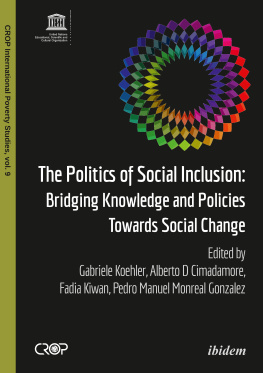The Social Politics of Research Collaboration
The past two decades have seen an increasing emphasis on large and interdisciplinary research configurations such as research networks, and centers of excellence including those in Social Sciences and Humanities research. Little research has been undertaken, however, to understand how these new large research structures that are being called forth by research funders and research/higher education institutions alike function socially, and what the impact of operating within such structures is on those working within, and those working with, them. Past writers have discussed the intra-agentic operations of human researchers and the material laboratory environment in its broadest sense. This volume is concerned with the social politics of research collaboration in relation to six key positions: leaders of large research formations, leaders of sub-projects within large collaborations, participant researchers, junior and early career researchers, advisory board members, and those who look in from the outside such as researchers who are un-funded. It explores the mostly unacknowledged but critical aspect of social structures in research, discussing issues such as struggles over leadership styles, the marginalization of researchers working cross-disciplinarily, power hierarchies and intellectual ownership, and the silencing of dissent in research.
Gabriele Griffin is Professor of Womens Studies at the University of York.
Katarina Hamberg is Professor in Family Medicine at Ume University in Sweden.
Britta Lundgren is Professor of Ethnology at the Department of Culture and Media Studies at Ume University.
Routledge Advances in Research Methods
E-Research
Transformation in Scholarly Practice
Edited by Nicholas W. Jankowski
The Mutual Construction of Statistics and Society
Edited by Ann Rudinow Stnan, Heidi Mork Lomell, and Svein Hammer
Multi-Sited Ethnography
Problems and Possibilities in the Translocation of Research Methods
Edited by Simon Coleman and Pauline von Hellermann
Research and Social Change
A Relational Constructionist Approach
Sheila McNamee and Dian Marie Hosking
Meta-Regression Analysis in Economics and Business
T.D. Stanley and Hristos Doucouliagos
Knowledge and Power in Collaborative Research
A Reflexive Approach
Edited by Louise Phillips, Marianne Kristiansen, Marja Vehvilinen and Ewa Gunnarsson
The Emotional Politics of Research Collaboration
Edited by Gabriele Griffin, Annelie Brnstrm-hman and Hildur Kalman
The Social Politics of Research Collaboration
Edited by Gabriele Griffin, Katarina Hamberg and Britta Lundgren
The Social Politics of Research Collaboration
Edited by Gabriele Griffin, Katarina Hamberg and Britta Lundgren
First published 2013
by Routledge
711 Third Avenue, New York, NY 10017
Simultaneously published in the UK
by Routledge
2 Park Square, Milton Park, Abingdon, Oxon OX14 4RN
Routledge is an imprint of the Taylor & Francis Group, an informa business
2013 Taylor & Francis
The right of Gabriele Griffin, Katarina Hamberg and Britta Lundgren to be identified as the authors of the editorial material, and of the authors for their individual chapters, has been asserted in accordance with sections 77 and 78 of the Copyright, Designs and Patents Act 1988.
All rights reserved. No part of this book may be reprinted or reproduced or utilised in any form or by any electronic, mechanical, or other means, now known or hereafter invented, including photocopying and recording, or in any information storage or retrieval system, without permission in writing from the publishers.
Trademark Notice: Product or corporate names may be trademarks or registered trademarks, and are used only for identification and explanation without intent to infringe.
Library of Congress Cataloging-in-Publication Data
The social politics of research collaboration / edited by Gabriele Griffin,
Katarina Hamberg and Britta Lundgren. 1st Edition.
pages cm. (Routledge advances in research methods ; 8)
Includes bibliographical references and index.
1. Social sciencesResearchMethodology. 2. LeadershipSocial aspects. 3. Research teams. I. Griffin, Gabriele.
H62.S67363 2013
001.4dc23
2013003436
ISBN13: 978-0-415-85701-7 (hbk)
ISBN13: 978-0-203-70407-3 (ebk)
To the Joys of the Sociality of Research
The editors would like to acknowledge, first, the support in the form of a large five-year research grant of the Swedish Research Council for the Challenging Gender research program at Ume University, Sweden, 200711. The Ume Center for Gender Studies hosted this large project and wed like to thank Monica Forsell-Allergren, its administrator, for the myriad things she did and processes she managed to make the smooth running of the project possiblean admin star, if ever there was one.
The grant enabled a large number of gender researchers to come together over a period of five years to co-conduct research on gender in relation to health, violence, normalization, emotions, and democracy and justice. The Social Politics of Research Collaboration, and a separate volume, The Emotional Politics of Research Collaboration (also Routledge 2013) in which the workings and impact of emotions on co-researching are explored, were conceived as part of that research program. This volume articulates our experiences of and thinking about both the social politics of the collaboration we had in Challenging Gender and other joint research projects we have been part of.
The editors would also like to thank all the participants in that research program. Their interactions, reflections, discussions, and theoretical considerations inspired and informed this volume. This also goes for Nira Yuval-Davis, Naomi Scheman, Philomena Essed, Raewyn Connell, Margaret Davies, Johanna Niemi, Ellen Annandale, and all the other people with whom we dialogued and multi-logued during that time in connection with this volume.
Finally, the editors would like to thank Max Novick, Jennifer Morrow, and the team at Routledge for their support and enthusiasmwe have very much valued your input.
Gabriele Griffin, with Katarina Hamberg and Britta Lundgren
[An EU project co-ordinator] explained that working with partners, not only from other countries, but also from other streams [within his discipline], allowed him to extricate himself from the national scientific community, which is extremely conservative and frozen, and (confined to) small circles and little mafia schools (Kuhn and Reme 2005: 128).
The highly charged vocabulary used in the quote above points to one of the many reasons why we embarked on this volume, namely the complex and difficult nature of the sociality of research that all research entails, and research collaboration makes particularly apparent. Small circles and mafia schools are one way in which researchers may describe their experiences of being an insider or an outsider within their home research environmentwhat they articulate through this is the notion of a set of social relations that contour and circumscribe the possibilities they have in the conduct of their research. This circumscription is structured through relations of power, of dependency, of loyalty, of employment, of friendship, of enmityand a host of other factors that are rarely discussed in the context of research collaboration because of the long tradition of viewing scientific enquiry as dis- or un-invested. Pierre Bourdieu (2004: 6869), for example, vigorously defends scientific endeavor in terms of its properties of closure, and the struggle for legitimacy in terms of dominance of a specific scientific representation of the real. But for all his talk of scientists he disavows notions such as calculated strategies of self-aggrandizement as part of researchers motivations. These strategies point to the encounter between scientists









